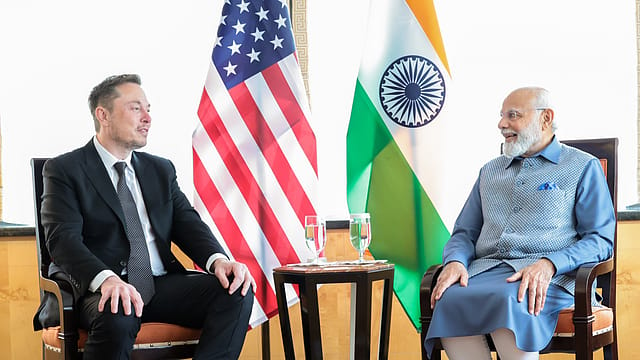Elon Musk postpones India visit to later this year
ADVERTISEMENT

Tesla CEO Elon Musk, who was earlier planning to meet Prime Minister Narendra Modi in India this month, has postponed his visit to the country to later this year.
Musk cited "very heavy Tesla obligations" for postponing his planned visit to India.
"Unfortunately, very heavy Tesla obligations require that the visit to India be delayed, but I do very much look forward to visiting later this year," Musk says in a post on X.
Tesla will post its financial results for the first quarter of 2024 after market close on April 23, 2024.
This comes at a time when Tesla sales in the quarter ended March 31, 2024, declined for the first time since 2020. The world's largest electric carmaker reported an 8.5% year-on-year drop in sales as demand for EVs took a backseat in the U.S. As a result, Tesla's market share has declined from 62% at the start of 2023 to 51% now.
In the first quarter, Tesla produced over 433,000 vehicles and delivered approximately 387,000 vehicles.
"Decline in volumes was partially due to the early phase of the production ramp of the updated Model 3 at our Fremont factory and factory shutdowns resulting from shipping diversions caused by the Red Sea conflict and an arson attack at Gigafactory Berlin," Tesla said.
January 2026
Netflix, which has been in India for a decade, has successfully struck a balance between high-class premium content and pricing that attracts a range of customers. Find out how the U.S. streaming giant evolved in India, plus an exclusive interview with CEO Ted Sarandos. Also read about the Best Investments for 2026, and how rising growth and easing inflation will come in handy for finance minister Nirmala Sitharaman as she prepares Budget 2026.
Musk's planned India visit was to announce investment plans for the country. Tesla is currently scouting locations to set up a plant, with Maharashtra and Gujarat being the frontrunners.
"India is now the most populous country in the world, based on population. It's a natural progression to provide Tesla electric vehicles in India," Musk said earlier.
The Indian government recently unveiled a new EV import policy that slashes import duty to 15% from 100% for EVs costing $35,000. Under the new policy, automakers are required to make a minimum investment of ₹4,150 crore or $500 million. The government has given a three-year timeline to automakers for setting up new manufacturing facilities in India and starting commercial production of EVs, and reaching 50% domestic value addition (DVA) within 5 years at the maximum. A localisation of 25% is to be achieved by the third year and 50% by the fifth year.
The duty foregone on the total number of EVs allowed for import would be limited to the investment made or ₹6,484 crore (equal to incentive under the PLI scheme) whichever is lower. A maximum of 40,000 EVs at the rate of not more than 8,000 per year would be permissible if the investment is of $800 million or more. The carryover of unutilised annual import limits would be permitted. The investment commitment made by the company will have to be backed up by a bank guarantee in lieu of the custom duty forgone. The bank guarantee will be invoked in case of non-achievement of DVA and minimum investment criteria defined under the scheme guidelines.
